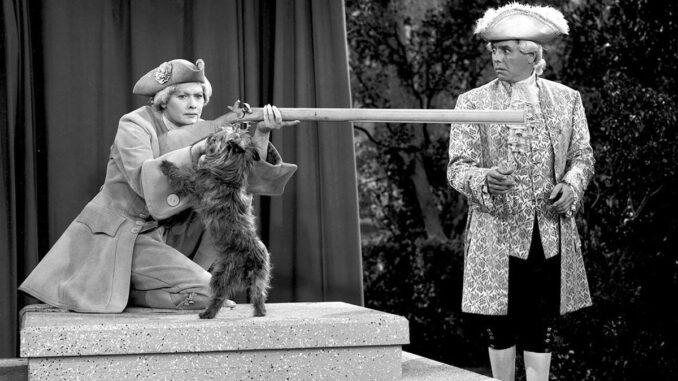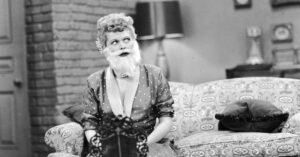
Introduction: The End of an Era
Few shows have left as indelible a mark on television as I Love Lucy. From its debut in 1951 to its finale in 1957, the sitcom redefined comedy, family dynamics, and even how television was produced. But how did this iconic series wrap up its storylines? Was it a grand finale, or did it fade quietly into the annals of TV history? Let’s dive into the unforgettable ending of I Love Lucy and why it still resonates today.
The Journey to the Finale
A Groundbreaking Show That Changed Television
Before we talk about the ending, let’s take a moment to appreciate what I Love Lucy accomplished. It wasn’t just another sitcom—it was the first show to use a multi-camera setup, revolutionize syndication, and bring real-life issues like pregnancy into the living room.
Lucy and Ricky’s Unmatched Chemistry
The show thrived on the dynamic between Lucille Ball and Desi Arnaz, who were married both on-screen and off-screen. Their comedic timing and heartfelt moments made the Ricardos feel like family to millions of viewers.
The Final Season: A Shift in Dynamics
From New York to Connecticut
By the sixth and final season, the Ricardos had moved from their bustling New York City apartment to a suburban home in Connecticut. This shift reflected the changing aspirations of 1950s America but also marked a departure from the show’s earlier charm.
The Strain Behind the Scenes
While fans adored the Ricardos, tension simmered behind the scenes. Lucille Ball and Desi Arnaz’s marriage was crumbling, adding an emotional weight to the final episodes.
The Last Episode: “The Ricardos Dedicate a Statue”
A Modest Farewell
Unlike modern TV shows that often build up to a dramatic finale, I Love Lucy ended with little fanfare. The final episode, “The Ricardos Dedicate a Statue,” aired on May 6, 1957.

The Plot of the Final Episode
In the episode, Lucy accidentally ruins a Revolutionary War statue that Ricky is set to dedicate. Chaos ensues as Lucy tries to fix the situation, showcasing her trademark slapstick humor.
No Grand Goodbye
Surprisingly, the episode didn’t feel like a farewell. There were no tearful goodbyes or reflective moments. For fans, it felt like just another hilarious day in the life of Lucy and Ricky.
Why Was There No Grand Finale?
The Changing Landscape of Television
In the 1950s, TV shows didn’t often have the elaborate finales we see today. Most series ended without acknowledging their departure, and I Love Lucy was no exception.
Transition to The Lucy-Desi Comedy Hour
The Ricardos’ story didn’t end entirely. The characters transitioned into a new format, The Lucy-Desi Comedy Hour, which aired until 1960. This allowed fans to continue following Lucy and Ricky’s antics, albeit in a slightly different format.
The Legacy of the Ending
A Timeless Classic
Even without a dramatic finale, I Love Lucy remains timeless. The humor, heart, and groundbreaking storytelling continue to captivate audiences.
What Modern Shows Can Learn
The understated ending of I Love Lucy serves as a reminder that sometimes, less is more. It’s not always about how a show ends but how it lives on in the hearts of its fans.
Behind-the-Scenes Tidbits About the Finale
Lucille Ball’s Feelings About the Ending
Lucille Ball reportedly didn’t view the final episode as the end. She saw The Lucy-Desi Comedy Hour as a continuation, which is why the finale lacked closure.
Desi Arnaz’s Vision
Desi Arnaz, ever the visionary, was already looking ahead to new projects, which may explain the seamless transition to the new format.
How Fans Reacted to the Ending
Mixed Emotions
Some fans were disappointed by the lack of a definitive ending, while others were just happy to keep seeing Lucy and Ricky in any capacity.
The Power of Nostalgia
Over the years, the ending has become a nostalgic touchpoint for fans, symbolizing a simpler time in television history.
Conclusion: Why I Love Lucy’s Ending Still Matters
While the ending of I Love Lucy may not have been the grand spectacle we expect today, it perfectly encapsulated the show’s essence—lighthearted, funny, and endlessly entertaining. It didn’t need a dramatic farewell because the Ricardos’ adventures never truly ended in the hearts of their fans.
FAQs
1. Why didn’t I Love Lucy have a grand finale?
In the 1950s, it wasn’t common for TV shows to have elaborate finales. The characters transitioned into The Lucy-Desi Comedy Hour, which continued their story.
2. What happened in the last episode of I Love Lucy?
The final episode, “The Ricardos Dedicate a Statue,” featured Lucy accidentally destroying a statue Ricky was supposed to dedicate, leading to classic comedic chaos.
3. Did Lucille Ball and Desi Arnaz continue working together after the show?
Yes, they continued to play Lucy and Ricky in The Lucy-Desi Comedy Hour until 1960, despite their personal marital struggles.
4. How did fans react to the ending?
Fans had mixed feelings—some were disappointed by the lack of closure, while others were thrilled to see the Ricardos continue in a new format.
5. What is the legacy of I Love Lucy?
The show remains a timeless classic, celebrated for its humor, innovation, and ability to connect with audiences across generations.